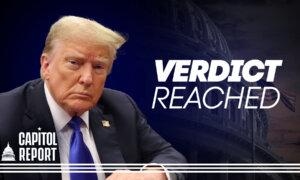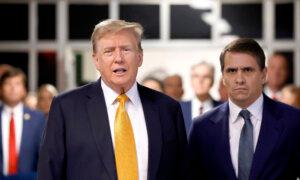With this verdict, Trump becomes the first ever former president to be convicted of a crime.
NEW YORK—Former President Donald Trump was found guilty of 34 felony counts of falsifying business records, as a jury of 12 unanimously returned their verdict on May 30 after less than two days of deliberation. With this result, President Trump becomes the first ever American president to be convicted of a crime.
As the verdicts were read, President Trump sat still, appearing stoic, and looked straight ahead.
President Trump’s attorney has previously vowed to appeal a conviction expeditiously.
Judge Juan Merchan set the sentencing hearing for 10 a.m. on July 11. This is four days before the Republican National Convention where the former president is set to be formally designated as GOP nominee.
After the ruling, President Trump blasted the decision.
“This was a rigged decision right from day one. And we will fight for our Constitution,” he said outside the courtroom.
The verdict comes after a six-week trial with 22 witness testimonies. Closing arguments were made on May 28, and the jury began deliberations shortly before noon the next day. Manhattan District Attorney Alvin Bragg had charged President Trump with 34 counts of falsifying business records in the first degree, a class E felony.
Prosecutors alleged that President Trump fraudulently misclassified hush money payments to adult film actress Stephanie Clifford as part of an attempt to interfere with the 2016 presidential election.
President Trump has repeatedly called the criminal case political persecution and an act of election interference. He faces three other prosecutions in Washington, Georgia, and Florida over his efforts to contest the 2020 election results and handling of classified documents.
“It was a very unfair trial. It should never have happened,” President Trump said outside the Manhattan courtroom on May 19 after the jury began deliberation.
New York Fraud Law
Manhatten prosecutors charged President Trump with felony-level business records falsification, which requires the fraud to be carried out to commit or conceal another crime.
Prosecutors alleged that the secondary crime is a New York election law that criminalizes conspiracy “to promote or prevent the election of any person to a public office by unlawful means.”
The unlawful means identified by prosecutors were violations of the Federal Election Campaign Act, the falsification of other business records, or violations of tax laws. Judge Merchan ruled that the jury did not have to unanimously agree on what the “unlawful means” was.
The prosecution also did not have to prove that the secondary crime was in fact committed.
The jury was instructed on the concept of accessorial liability, which explains that President Trump did not have to commit the crimes himself to be held criminally liable.
Competing Narratives
During closing arguments on May 28, defense attorneys spent two and a half hours trying to convince the jury the government had failed to prove its case.
Defense attorney Todd Blanche reminded jurors that key elements of the case—President Trump’s knowledge and involvement, and the method for the allegedly misclassified payments—hinged on ex-lawyer and witness Michael Cohen, who shared personal reasons for wanting to see his former boss punished.
“He lied to Congress. He lied to prosecutors. He lied to his family and business associates,” Mr. Blanche said of Mr. Cohen, calling him the “MVP of liars.” He asked jurors to question whether Mr. Cohen truly seemed the type to do work for President Trump for no pay in 2017 and 2018, after receiving a $525,000 salary during his decade at Trump Organization.
Prosecutors spent five hours, twice the time the defense took, to recap their case and try to convince the jury there was “overwhelming” evidence.
Prosecuting attorney Joshua Steinglass acknowledged their flawed witnesses, arguing the government didn’t “choose” Mr. Cohen to be their key witness, but that President Trump “chose” him to be his “fixer.” He claimed Mr. Cohen was the only alleged coconspirator to have paid for his role in a scheme to influence the election, and his animosity toward the former president was only to be expected.
“He made his bed. But you can hardly blame him for making money from the one thing he has left, which is his knowledge of the inner workings of the Trump Organization,” Mr. Steinglass argued.
He pointed to a secret recording Mr. Cohen made of his boss, capturing a truncated conversation, and the contract Mr. Cohen signed to secure a story that he believed would damage the Trump Campaign, arguing this showed a “cavalier willingness to hide this payoff”—the intent to defraud.
34 Records
The 34 records in question included 11 checks issued to Michael Cohen, formerly a personal attorney to President Trump, totaling $420,000 over 11 months in 2017, along with their corresponding invoices and vouchers. The additional single record is due to a lost check that necessitated the creation of a replacement to pay Mr. Cohen.
Mr. Cohen testified that he paid $130,000 to adult actress Stephanie Clifford, better known as adult performer Stormy Daniels, in a non-disclosure settlement agreement, to prevent the publication of a story that then-candidate Trump believed would hurt his campaign.
Ms. Clifford claimed she had a story about a sexual encounter with Mr. Trump from 2006, and that media outlets were interested in this story after an Access Hollywood tape of Mr. Trump recorded via a hot mic was released. At trial, Ms. Clifford testified about this alleged sexual encounter, which President Trump has denied.
Mr. Cohen testified that he made this payment in 2016 with the understanding that his employer, then-candidate Trump, would reimburse him. The deal was closed less than a month before the election, and Mr. Cohen testified he originally intended to delay payment until after the election, after which he claimed his boss said it would not matter if the story was published and thus the $130,000 would no longer need to be paid.
On the witness stand, Mr. Cohen painted the picture of urgency in mid-October 2016, when representatives for Ms. Clifford pressed him for payment and said he only wanted to make his boss happy. He testified that, with Mr. Trump’s approval, he made the payment.
He also testified to being intensely angry later that year, when he discovered his bonus had been cut by two-thirds from what he typically received.
It prompted discussions with former Trump Organization CFO Allen Weisselberg, who purportedly drew up plans to reimburse Mr. Cohen $130,000 for the payment to Ms. Clifford and $50,000 for an earlier payment to Red Finch, which he said he still hadn’t been reimbursed for. The sum was then doubled to $360,000 to account for taxes, and Mr. Weisselberg added $60,000 to supplement Mr. Cohen’s bonus.
Prosecutors had claimed Mr. Weisselberg’s “grossing up” the figures for tax purposes was evidence he intended to “camouflage” reimbursement as income.
This $420,000 was then paid to Mr. Cohen via monthly checks throughout 2017. At trial, prosecutors sought to show that President Trump had caused false records to be entered when Mr. Weisselberg, acting as a co-conspirator, directed his comptroller Jeffrey McConney and bookkeeper Deb Tarasoff to process these payments.
President Trump was not directly charged with conspiracy, and prosecutors had no burden to prove either the goal or the state of mind behind any alleged conspiracy.
Original News Source Link – Epoch Times
Running For Office? Conservative Campaign Consulting – Election Day Strategies!


